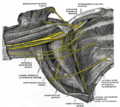Axillary artery: Difference between revisions
CSV import Tags: Removed redirect mobile edit mobile web edit |
CSV import |
||
| Line 28: | Line 28: | ||
[[Category:Arteries of the upper limb]] | [[Category:Arteries of the upper limb]] | ||
{{anatomy-stub}} | {{anatomy-stub}} | ||
== Axillary_artery == | |||
<gallery> | |||
File:Axillary_limits.PNG|Axillary limits | |||
File:Pectoralis_minor.svg|Pectoralis minor | |||
File:Axillary_branches.PNG|Axillary branches | |||
File:Gray576.png|Gray's Anatomy Plate 576 | |||
File:Gray809.png|Gray's Anatomy Plate 809 | |||
File:Gray810.png|Gray's Anatomy Plate 810 | |||
File:PLEXUS_BRACHIALIS.jpg|Plexus brachialis | |||
File:Slide3v.JPG|Slide 3v | |||
File:Slide2bbbb.JPG|Slide 2bbbb | |||
File:Slide9JJJ.JPG|Slide 9JJJ | |||
File:Slide11OOO.JPG|Slide 11OOO | |||
File:Slide15SSS.JPG|Slide 15SSS | |||
</gallery> | |||
Latest revision as of 20:56, 23 February 2025
Axillary artery is a large blood vessel that conveys oxygenated blood to various parts of the upper body, including the pectoral region, axilla, and upper limb. It is a continuation of the subclavian artery and becomes the brachial artery after it crosses the lower border of the teres major muscle.
Anatomy[edit]
The axillary artery begins at the lateral border of the first rib, becoming the brachial artery at the lower border of the teres major. It is divided into three parts by the pectoralis minor muscle. The first part contains one branch, the second part two branches, and the third part three branches.
Branches[edit]
The axillary artery gives off several branches, which supply blood to the chest, shoulder, and upper limb. These include:
- Superior thoracic artery
- Thoracoacromial artery
- Lateral thoracic artery
- Subscapular artery
- Anterior circumflex humeral artery
- Posterior circumflex humeral artery
Clinical significance[edit]
The axillary artery is of clinical importance in several medical and surgical contexts. It can be involved in thoracic outlet syndrome, aneurysm, and arteriovenous fistula. It is also a common site for arterial puncture during cardiac catheterization.
See also[edit]
Axillary_artery[edit]
-
Axillary limits
-
Pectoralis minor
-
Axillary branches
-
Gray's Anatomy Plate 576
-
Gray's Anatomy Plate 809
-
Gray's Anatomy Plate 810
-
Plexus brachialis
-
Slide 3v
-
Slide 2bbbb
-
Slide 9JJJ
-
Slide 11OOO
-
Slide 15SSS












